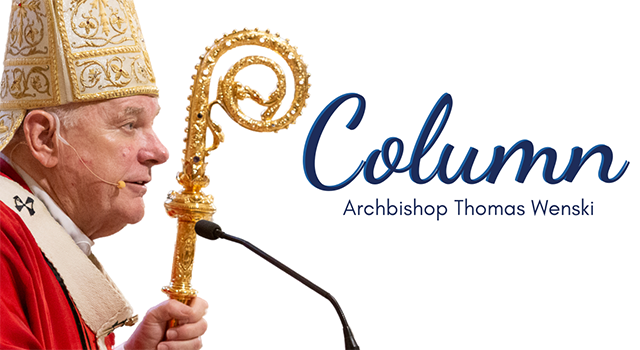By Archbishop Thomas Wenski - The Archdiocese of Miami
On October 7, the feast of the Most Holy Rosary, the world watched the slaughter launched by Hamas terrorists from Gaza and the rapid call to arms from Israel that ensued.
Our world is going through one of its most difficult and painful periods in recent times. For over a year, Ukraine has been engaged in a war for its existence. And, now since early October, we have been inundated with images of horrors which have reawakened ancient traumas, opened new wounds, and made pain, frustration and anger explode in the Holy Land and beyond.
The conflict has presented the peoples who inhabit the Holy Land with a “Sophie’s choice” that offers no good options. What happened on October 7th in southern Israel can in no way be justified or excused. We cannot but condemn it. There can be no reason for such a barbarous atrocity. Such senseless violence will never lead to peace or justice for aggrieved Palestinians but only begets more violence as Israel fights to eliminate an existential threat to its survival as a nation state.
But this new cycle of violence has brought to Gaza over 5,000 deaths, including many women and children, tens of thousands of wounded, neighborhoods razed to the ground, lack of medicine, lack of water and of basic necessities for over two million people. The continuous heavy bombardment that has been pounding Gaza for weeks has only caused more death and destruction and will only increase hatred and resentment. It will not solve any problem, but rather create new ones. “An eye for an eye” mentality will only leave everyone blind.
Both Palestinians and Jews need peace and justice. There will be neither peace nor justice if either side denies the humanity, the dignity and the rights of the other. Hating your neighbors is a grave sin against God, who created us all in his image and likeness. To break the cycle of violence that continues to erupt over the past decades requires the engagement of the religious, civil, and political society of each side — as well as the international community — to work more seriously than it has so far towards a solution that respects the rights, the needs, and the aspirations of both Israelis and Palestinians.
The Latin Patriarch of Jerusalem, Cardinal Pierbattista Pizzaballa, in calling for an end to this war, wrote in a letter addressed to his flock of Palestinian and Israeli Catholics:
“To have the courage of love and peace here, today, means not allowing hatred, revenge, anger, and pain to occupy all the space of our hearts, of our speech, of our thinking. It means making a personal commitment to justice, being able to affirm and denounce the painful truth of injustice and evil that surrounds us, without letting it pollute our relationships. It means being committed, being convinced that it is still worthwhile to do all we can for peace, justice, equality, and reconciliation. Our speech must not be about death and closed doors. On the contrary, our words must be creative, lifegiving, they must give perspective and open horizons.”
The conflict in the Holy Land has enflamed passions in our own communities, on social media, and around the world. Incidences of antisemitism, of “islamophobia” or any other tendency to sow hatred against other people or faiths must not be tolerated. The Second Vatican Council teaches, “The Church reproves, as foreign to the mind of Christ, any discrimination against men or harassment of them because of their race, color, condition of life, or religion.”
May all who love the Holy Land seek to bring about among all the parties engaged in the fighting a cessation of violence, respect for civilian populations and the release of hostages. Let us pray urgently for peace and recall before the Lord all the families and individuals suffering from these events.
While much seems to speak of death and endless hatred, we must never grow weary in praying for peace in the land that Our Lord, the Prince of Peace, called home.


Comments from readers